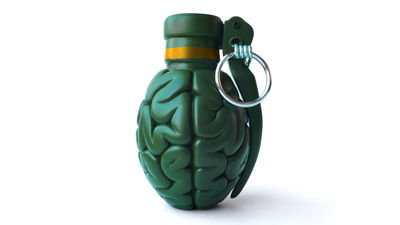Increased cortisol due to chronic stress reduces memory and thinking ability and causes brain contraction

by Kevin Grieve
Although the influence of stress on the human body varies, it is obvious that cortisol, which is a type of hormone, is increased by receiving stress, thereby decreasing memory and thinking power, and also shrinking the volume of the brain It is getting.
Circulating cortisol and cognitive and structural brain measures | Neurology
http://n.neurology.org/content/early/2018/10/24/WNL.0000000000006549

It Might Stress You Out to Know What Stress Is Doing to Your Brain
https://www.livescience.com/63913-stress-messes-with-brain.html
It is quite natural that a human body responds to stress, and it can be said that it is a reaction that occurs when a part of the body senses danger or a threat. When you feel a lot of stress, the blood cortisol concentration rises and causes a reaction called fighting or escape or a reaction with another hormone called adrenaline. Specifically, cortisol increases blood glucose or sugar, and uses these as energy sources to work the brain. And it seems to suppress the body function which the brain does not need in emergency such as digestion, regeneration, growth.
As the stress level decreases, blood cortisol concentration should decrease at the same time, but this reaction does not always occur as expected. It is because the body is stressed or unknown reasons have not yet been revealed because there are cases in which the cortisol concentration in the blood is stabilized at high levels. In addition, there may be cases where the stress that is received from everyday life in something and stressful contemporary society is too large, and the cortisol concentration in the blood has always been high in the blood.
Previous studies have confirmed that heart and skin will be damaged if such cortisol concentrations are high in such blood chronically. Therefore, it is not surprising that the stress and increase in cortisol in the blood affect memory and brain functions.

by Valentin Salja
In the meantime, Dr. Justin Echouffo-Tcheugui of Johns Hopkins medical school presented the latest research paper on brain and stress at Neurology of neuroscience magazine.
In the study, we analyzed the data of " Framingham Heart Study ", a follow-up survey of health status for people living in Framingham, Massachusetts, from which 2231 healthy subjects (average age 49 years old) who are not dementia were identified . At the same time, we conducted a test on psychological tests and memory / thinking skills in 2231 people, collected blood samples of subjects, and also scanned the brain with MRI.
Analysis of the collected data revealed that people with high levels of cortisol in the blood gave lower scores in memory and thinking tests than those with normal cortisol levels. In addition, people with high cortisol concentration in the blood have also been confirmed that the volume of the brain is shrinking. Moreover, this tendency seems to be more conspicuous among women.
It has already been clarified from past studies that long-term stress reduces the brain.
It is pointed out that long-term stress shortens the brain and may cause dementia - GIGAZINE

Dr. Echouffo-Tcheugui stated that the results of this study are only those that some people have shown from cortisol the effect they have received over a period of time. However, given that various body tissues are harmfully affected by rising blood cortisol levels, "physicians and the general public should pay more attention to the possibility of the brain being damaged by stress" "It is important for people to find ways to reduce stress."
Dr. Paul George, a neuroscientist at Stanford University School of Medicine, an expert in this field, said, "There is a need for further exploration of how cortisol affects the brain and cognition." Dr. Echouffo-Tcheugui's research pointed out that evaluating the volume change of the brain using multiple images is superior. Furthermore, because of the large scale of the research, we were able to exclude confusion factors such as depression, and also evaluated that it was a sound analysis.

by jesse orrico
However, since the blood cortisol concentration in the survey relies on blood samples obtained by 1 degree blood sampling, it is difficult to ascertain the cause of the subject's stress and how long the stress lasted The problem is pointed out.
Still, Dr. Echouffo-Tcheugui stated that there are advantages in relieving stress by sleeping, exercise, relaxation, etc., or ingesting a drug that lowers cortisol concentration in the blood, "It is a bad point There is not one. "

Related Posts:
in Science, Posted by logu_ii






